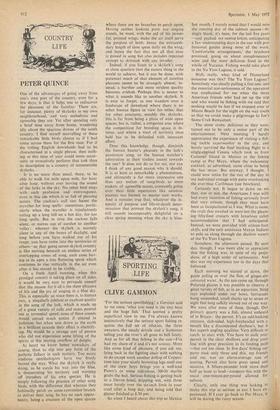PETER QUINCE
One of the advantages of going away from one's own part of the country, even for a few days, is that it helps one to rediscover the pleasures of the familiar. There are, for instance, plenty of skylarks in my own neighbourhood, and very melodious and agreeable they are. Yet after spending only a brief time away from home, wandering idly about the spacious downs of the south country, I find myself marvelling at these remarkable little birds almost as if I had come across them for the first time. For if the rolling English downlands had to be characterised in a single phrase, then noth- ing at this time of year could more accur- ately or evocatively perform that task than its description as a country of innumerable skylarks.
It is no more than usual, there, to be able to walk for mile upon mile, for hour after hour, without ever leaving the sound of the larks in the sky. No other bird sings with such profusion and extravagance, even in this isle which is so full of pleasing noises. The cuckoo's call can haunt the traveller for long spells: sometimes, partic- ularly when the traveller is injudiciously toiling up a long hill on a hot day, for too long spells. But in time the cuckoo falls silent, or moves out of earshot to another valley: whereas the skylark is scarcely silent in any of the hours of daylight, and long before you have walked out of his range, you have come into the territories of others—so that going across skylark country is like moving beneath an endless series of overlapping cones of song, each cone hav- ing at its apex a tiny fluttering speck which continues to rise vertically in the air even after it has ceased to be visible.
On a fresh April 'morning, when this prodigal concert is taking place on all sides, it would be very easy to persuade oneself that the reason for it all is the sheer pleasure of life and the joy of singing in a blue sky. This is especially so since there is, to human ears, a singularly jubilant or exultant quality in the song of the lark, which is made up of a great variety of calls and notes poured out at torrential speed; none of these sounds would attract much notice if uttered in isolation, but when sent down to the earth in a brilliant cascade their effect is electrify- ing. He would be a strange sort of person who did not experience some lifting of the spirits at this searing overflow of delight. At heart we know better nowadays, of course, than to slip into any form of the pathetic fallacy in such matters. Too many studious ornithologists have too firmly barred the way. What the skylark is really doing, as he carols his way into the blue, is demarcating his territory and Warning off intruders of his own species. He is simply following the practice of other song birds, with the difference that whereas they habitually perch on some convenient branch to deliver their song, he has no such oppor- tunity, being a creature of the open spaces where there are no branches to perch upon. Having neither lookout posts nor • singing stands, he must, with the aid of his power- ful, pointed wings, make the air itself serve the purpose of both; hence the extraordi- nary length of time spent daily on the wing, and hence the fact that not all that time is passed in song but also includes repeated swoops to skirmish with any invader. •
Indeed, if you listen to a skylark's song at close quarters (not the easiest thing in the world to achieve, but it can be done, with patience) much of that element of carefree pleasure seems to be strangely absent; in- stead, a harsher and more strident quality becomes evident. Perhaps this is nearer to what it sounds like to another skylark. It is easy to forget, as one wanders over a landscape of downland where there- is no other human figure in view for miles, that for other creatures, notably the skylarks, this is far from being a place of wide open spaces, but is, rather, a congested area where the competition for breeding space is in- tense, and where a tract of territory once held has to be defended with incessant effort.
Does this knowledge, though, diminish the human hearer's pleasure in the lark's passionate song, or the human watcher's admiration at their tireless ascent towards the sun? It does not do so for me, nor can I think of any good reason why it should. It is at least as remarkable a phenomenon, and ultimately a far more impressive one than any notion of song-birds as mere makers of agreeable noises, constantly going over their little repertoires like amateur pianists too limited to master new works. And it remains true that, whatever the in- tensity of purpose and life-or-death deter- mination that prompt the_skylark's song, it still sounds incomparably delightful on a clear spring morning when the sky is blue.


































 Previous page
Previous page